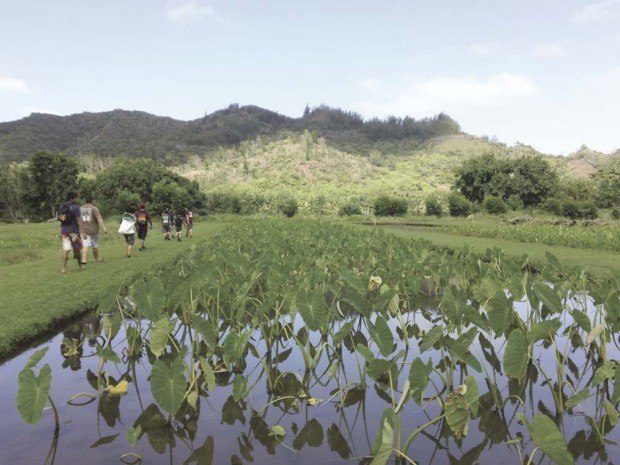ANAHOLA — On Aug. 8 public charter school Kanuikapono will begin the school year on a permanent campus for the first time.
“This is our tenth year as a charter school,” said Ipo Torio, executive director of Kanuikapono. “We are grateful to everyone who has been a part of the journey; over the years we have persevered the challenges, celebrated the successes, and continue to get better at what we do.”
“This is monumental for our school,” administrator Delton Johnson said, adding that it will allow for energy and focus towards the school’s mission of providing cultural- and project-based education.
Kanuikapono teaches grades K-12 and currently has approximately 120 enrolled students, with class sizes averaging between 12 and 18 students.
“With all grades and all staff on one campus we are going to be so much more effective and stronger in our educational program as well as operations,” said Torio.
Kanuikapono is one of the few schools that recently met the 2011 preliminary Annual Yearly Progress requirements of the No Child Left Behind Act, which is based on student assessment scores. The school’s AYP status is “In good standing, Unconditional,” according to the state Department of Education school report. Statewide, only 40 percent of public non-charter schools and only 29 percent of public charter schools met the requirements.
“We have met AYP again this year,” said Torio. “The entire learning ‘ohana working together towards continuous improvement is what makes meeting AYP possible — our instructional program is innovative, creative, and rigorous in so many ways,” Torio said. “Making AYP is sort of the minimum expectation for all of us at the school; we continue to lift the bar, thanks to our hardworking students, teaching staff, parent group, and leadership.”
Although the Learning Center in Anahola is now the school’s home, Kanuikapono will continue its relationships with outreach sites on island.
“We have a strong collaborative partnership with Waipa, Kalalea Uka Native Plants Nursery, and the National Tropical Botanical Gardens,” said Torio. “Our students visit these sites regularly to learn from experts in a hands-on way that engages them and then our teachers bridge the outdoor learning experiences into the classroom.”
Last year first-grade teacher Shelby Dabin took her students to Waipa once a month, integrating the state science standards into all that Waipa has to offer via the project/culturally based learning model, school administrator Sarah Schoenfeld said.
This summer, middle and high school students participated in NTBG’s five week Kokua ‘Aina Youth Initiative Program which allowed students to discover ‘green collar’ career pathways, where students worked on various projects, including reforestation at Limahuli, working with NOAA and the monk seal awareness group. The students also spent time on hikes and in nurseries identifying and discussing native plants and agriculture, according to Cherisse Kent, Environmental Educator with NTBG who worked with the students daily.
The Learning Center in Anahola will now encompass elementary, middle and high schools all on the same campus for the first time, which the school views as a positive opportunity. Torio explained that Kanuikapono is based on the ‘ohana model.
“’Ohana is where we draw our strength, everyone cares for each other, the school, and the larger community,” she said.
Johnson said he is excited to have all ages together, and that the campus is large enough to allow younger and older children to have separate areas but students can be brought together to facilitate mentoring.
“We find mentoring to be a valuable experience for the older students who learn to malama the younger students and the younger students look up to the older students as positive role models.”
“We are an ‘ohana based school,” Johnson said. “We are able to do all that we do with limited funding because of the involvement of our families and the community — in our model, school is not separate from the family; we enroll students and their families.”
Tuition is free at Kanuikapono. Parents of students put in volunteer hours each semester to help fulfill the various needs of the school.
“Although we have a long way to go before we can say that charter schools receive equity as far as being a public school goes, we are doing an incredible job of maximizing our resources to deliver quality education despite funding and facilities issues,” said Aunty Puna Dawson, local school board director at Kanuikapono. “We are here today, stronger than ever, because we believe in what we do, we are good at what we do, and we intend to stay for a long, long time.”





